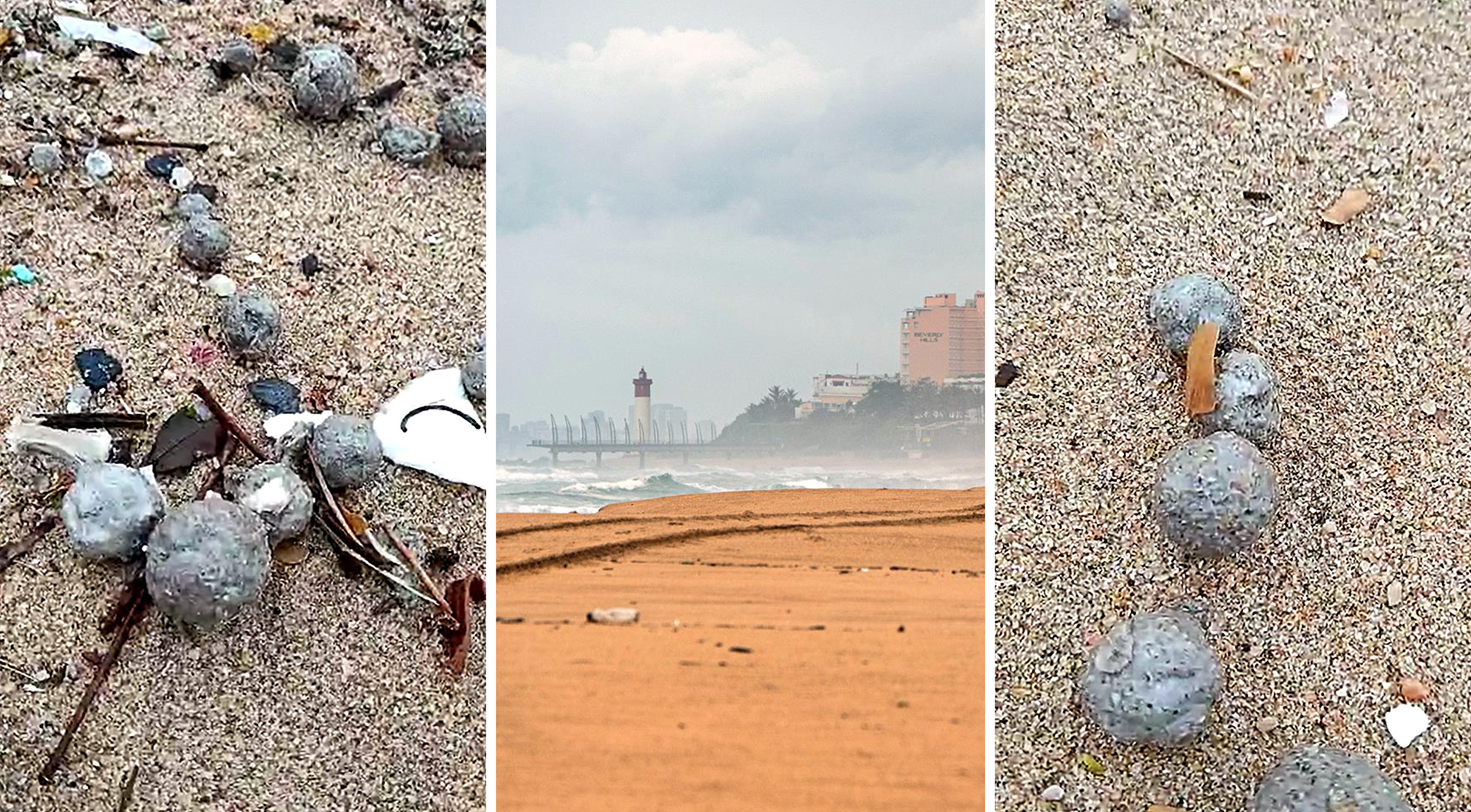In addition to the swimming ban, the city has announced a ban on all fishing and recreation at the Blue Lagoon due to severe sewage pollution near the mouth of the Umgeni River
The eThekwini (Durban) municipality has banned swimming at two major tourist beaches after numerous, sand-coated “beach balls” washed up along the Umhlanga beachfront.
Simultaneously, the city has announced a ban on all fishing and recreation at the Blue Lagoon due to severe sewage pollution near the mouth of the Umgeni River.
Blue Lagoon is a popular angling spot for recreational and subsistence fishers, though several anglers and bait collectors previously interviewed by Daily Maverick at this spot seemed apathetic or unaware of the potential risks of selling or consuming fish and estuarine organisms caught in contaminated water.
https://www.youtube.com/shorts/V7vmGIP_FrU
The Blue Lagoon is also a popular recreation area for canoeists, and the finishing line for the annual Dusi Canoe Marathon.
The latest swimming ban is restricted to Umhlanga Main Beach and Bronze Beach after scores of sand-encrusted spheres, each roughly the size of a golf ball, washed up on the beach below the Whalebone Pier.
The city said the bathing ban was a precautionary measure, pending a laboratory analysis of the sand ball samples, and cautioned against speculation that they originate from human sewage.
Other sources have suggested that the mystery bolletjies may be miniature “fat bergs” (small clumps of solidified restaurant fats and oils rolled into sand-covered spheres as a result of wave action).
Late last year, several beaches in Sydney, Australia, were also closed as a precaution after numerous similar-sized, but much darker, “beach balls” washed up near Bondi Beach.
Australian council officials said at the time that preliminary test results showed that the dark spheres were “tar balls” – formed when oil residue comes into contact with water and sand, usually as a result of marine oil spills.
At Umhlanga, however, the balls were found in the vicinity of a stormwater outlet on the beach, pointing to the illegal discharge of fats and oily food residue from local restaurants as a potential source.
In a statement on Tuesday, 8 January, eThekwini said it was aware of a video clip circulating on social media showing some of the “balls” mixed with beach sand found on the Umhlanga Main Beach. In the video, a person was heard referring to the balls as “dog faeces”.
“While the city cautions the public against circulating unverified information, Umhlanga Main Beach and Bronze Beach have been closed until further notice as a precautionary measure while the eThekwini Water and Sanitation Unit as well as the scientists from the Scientific Services conduct an analysis from the samples of the balls.
“At this stage, we cannot confirm if the balls are human waste, until confirmation by the laboratory investigation. The city wishes to warn the public against spreading unverified information.”
However, in a separate statement, eThekwini confirmed that it had been ordered by national government officials to ban all fishing and water recreational activities from the Umgeni Estuary to the Blue Lagoon non-bathing beach.
 The eThekwini (Durban) municipality notice. (Image: supplied)
The eThekwini (Durban) municipality notice. (Image: supplied)
“In accordance with the Coastal Compliance Notice issued by the (national) Department of Forestry, Fisheries and the Environment, the city has prohibited recreational and fishing activities from the Umngeni Estuary to the Blue Lagoon non-bathing beach.
“The city is conducting an extensive investigation to trace the source of the discharge of sewage effluent along the Umngeni Estuary. Once the investigation is complete, the city will undertake repairs to any damaged infrastructure that may have resulted in the discharge of untreated effluent into the Umngeni Estuary.”
In the statement, eThekwini sought (once again) to cast the blame on “theft and vandalism” of sewer infrastructure and “illegal connections into the sewer system” – but made no mention of the fact that it handed over control of 90% of its dilapidated wastewater treatment works to the para-statal utility uMngeni-uThukela Water more than a year ago due to persistent failures to remedy untreated sewage overflows into the Umgeni from the Northern and other wastewater treatment works.
Several of these sewage treatment failures predate the April 2022 floods which caused severe damage to local water and sanitation infrastructure. And, despite the intervention of uMngeni-Uthukela Water in November 2023, independent watchdog bodies such as Adopt-a-River and Talbot Laboratories have continued to measure consistently high levels of E. coli human sewage bacteria in the river.
Last month, for example, the E. coli levels in the Umgeni River were through the roof – almost 50 times higher than national seawater quality guidelines.
The city, however, said it was “making every effort to attend to all infrastructural defects that may pose a risk to the environment and urges the public to report vandalism and the theft of infrastructure to police so that perpetrators are apprehended.
“Fishermen are urged to adhere to the fishing restriction at the Umngeni Estuary and Blue Lagoon until further notice while the investigation is under way.”
The outlet pipes of the Northern Wastewater Treatment Works may be a good place to start this investigation.
In a newsflash late on January 8, the City said that tests by its Scientific Services division suggested that the balls were “fats, likely originating from food establishments” and that the two Umhlanga beaches would reopen on January 9.
“While findings indicate very low faecal contamination in water samples taken on 7 January 2025 at both the uMhlanga Main Beach and Bronze Beach, the source of the solid ‘ball’ matter is being profiled to confirm its origin. Beach clean-up operations will commence to remove the ‘ball’ shaped solid matter now that investigations have been carried out.” DM




 The Ethekwini (Durban) municipality notice. (Image: supplied)
The Ethekwini (Durban) municipality notice. (Image: supplied)